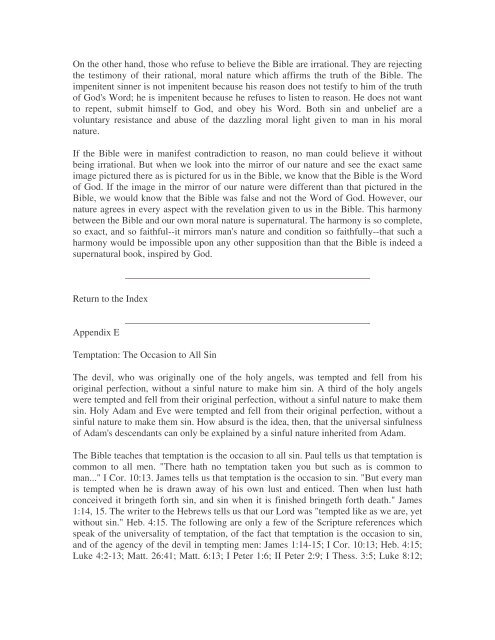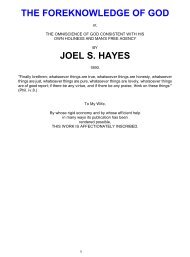Are Men Born Sinners? - Library of Theology
Are Men Born Sinners? - Library of Theology
Are Men Born Sinners? - Library of Theology
You also want an ePaper? Increase the reach of your titles
YUMPU automatically turns print PDFs into web optimized ePapers that Google loves.
On the other hand, those who refuse to believe the Bible are irrational. They are rejecting<br />
the testimony <strong>of</strong> their rational, moral nature which affirms the truth <strong>of</strong> the Bible. The<br />
impenitent sinner is not impenitent because his reason does not testify to him <strong>of</strong> the truth<br />
<strong>of</strong> God's Word; he is impenitent because he refuses to listen to reason. He does not want<br />
to repent, submit himself to God, and obey his Word. Both sin and unbelief are a<br />
voluntary resistance and abuse <strong>of</strong> the dazzling moral light given to man in his moral<br />
nature.<br />
If the Bible were in manifest contradiction to reason, no man could believe it without<br />
being irrational. But when we look into the mirror <strong>of</strong> our nature and see the exact same<br />
image pictured there as is pictured for us in the Bible, we know that the Bible is the Word<br />
<strong>of</strong> God. If the image in the mirror <strong>of</strong> our nature were different than that pictured in the<br />
Bible, we would know that the Bible was false and not the Word <strong>of</strong> God. However, our<br />
nature agrees in every aspect with the revelation given to us in the Bible. This harmony<br />
between the Bible and our own moral nature is supernatural. The harmony is so complete,<br />
so exact, and so faithful--it mirrors man's nature and condition so faithfully--that such a<br />
harmony would be impossible upon any other supposition than that the Bible is indeed a<br />
supernatural book, inspired by God.<br />
Return to the Index<br />
Appendix E<br />
Temptation: The Occasion to All Sin<br />
The devil, who was originally one <strong>of</strong> the holy angels, was tempted and fell from his<br />
original perfection, without a sinful nature to make him sin. A third <strong>of</strong> the holy angels<br />
were tempted and fell from their original perfection, without a sinful nature to make them<br />
sin. Holy Adam and Eve were tempted and fell from their original perfection, without a<br />
sinful nature to make them sin. How absurd is the idea, then, that the universal sinfulness<br />
<strong>of</strong> Adam's descendants can only be explained by a sinful nature inherited from Adam.<br />
The Bible teaches that temptation is the occasion to all sin. Paul tells us that temptation is<br />
common to all men. "There hath no temptation taken you but such as is common to<br />
man..." I Cor. 10:13. James tells us that temptation is the occasion to sin. "But every man<br />
is tempted when he is drawn away <strong>of</strong> his own lust and enticed. Then when lust hath<br />
conceived it bringeth forth sin, and sin when it is finished bringeth forth death." James<br />
1:14, 15. The writer to the Hebrews tells us that our Lord was "tempted like as we are, yet<br />
without sin." Heb. 4:15. The following are only a few <strong>of</strong> the Scripture references which<br />
speak <strong>of</strong> the universality <strong>of</strong> temptation, <strong>of</strong> the fact that temptation is the occasion to sin,<br />
and <strong>of</strong> the agency <strong>of</strong> the devil in tempting men: James 1:14-15; I Cor. 10:13; Heb. 4:15;<br />
Luke 4:2-13; Matt. 26:41; Matt. 6:13; I Peter 1:6; II Peter 2:9; I Thess. 3:5; Luke 8:12;






